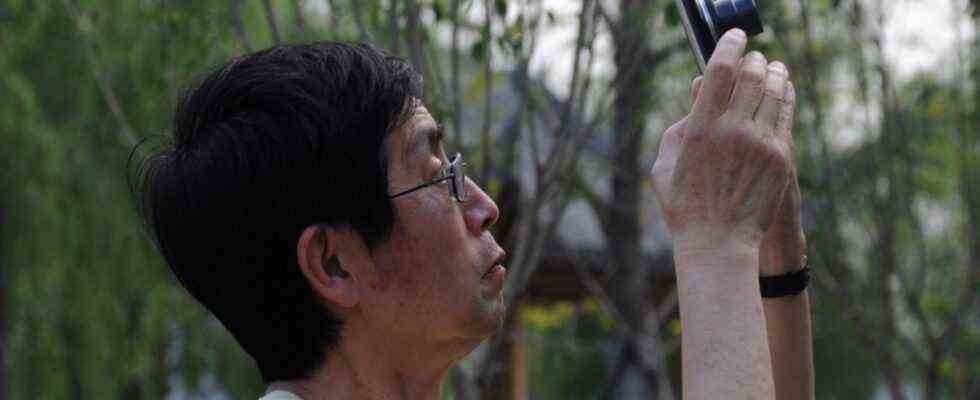It is an evening in late July in the summer of 1989. Hundreds of demonstrators have gathered on Munich’s Theresienwiese to send a message against the crackdown on the protest on Tiananmen Square in Beijing on June 4th. Using torches, they recreate the two Chinese characters that stand for the word “human rights”. The first speaker to appear is a gaunt man of about forty with a parka and sunglasses reciting a poem. “Infamous is the password of the infamous …” is the first line in the German translation. As soon as this line has faded away, the Chinese listeners join the text. They know it by heart and recite the first four stanzas like a chorale.
“The answer” is the title of this poem. In Beijing, Shanghai and other cities in the People’s Republic, it was the most famous anthem of the protest movement until the massacre on June 4th. The poem was written by the man who went to the microphone in Munich, his real name is Zhao Zhenkai, the world knows him as Bei Dao.
The poet is almost two months older than the People’s Republic, the beginning of which was proclaimed on October 1, 1949. For Chinese of this generation, this means a long, very dubious, often bitter treasure trove of experiences. This included political campaigns such as the first massive persecution of intellectuals (1956-1957) under the cynical slogan “Let a hundred flowers bloom”. Famines such as “The Great Leap Forward” (1958-1962), popularly often euphemistically called “The Years of Need”, which cost tens of millions of compatriots their lives. Or that period of the “smashing of the old” (1966-1977) which went down in bloody history under the name “Cultural Revolution”.
Nourishing hunger, longing for electric light, fear of shame
These three examples are only mentioned here because, as a historical film, they could provide the necessary historical dimension to the autobiographical sketches of the author of “Das Stadttor geht auf” for a non-Chinese readership. But more on that later.
The focus must be on the artistic mastery with which Dao knows how to draw the cosmos of a society that is primarily characterized by lack and fear with very few and yet so precise lines from supposed everyday stories of his childhood and youth. From tempting smells on the street, which cause the child to be hungry again and again, from the longing for electric light so that they can still read a textbook after dark. And about the fear of falling into the social abyss by failing exams – or the shame of being stigmatized as a child of a “bourgeois” family and thus exposed to the worst persecution.
The child, the adolescent learns to adapt, learns to make strategic connections, learns the rules of the pack. This is the one world. At the same time, however, there is still the world of a widely ramified family: It has a family tree that goes back deep into the imperial, but also into the revolutionary republican past. There is always one, usually several uncles and aunts in this big country, these are connections that are more reliable than the windy coalitions with political factions. If they can be charged.
When Bei Dao lets us look into a living room, the walls are always as thin as rice paper. Everyone knows most of their neighbors. Can you help, can you help, should you help? Or simply state that there has been another suicide, a tragic but by no means rare point in everyday life?
At Dao: The city gate opens. A youth in Beijing. Translated from the Chinese by Wolfgang Kubin. Hanser, Munich 2021. 336 pages, 24 euros.
When it comes to Dao, do not keep silent, that is one of the great strengths of this book, how even he became a cruel actor in this event during the Cultural Revolution. Yes, he too shouted and mentally and physically abused the culprits reported by the “revolution”. A child, a youth of his time, but that is no excuse for him.
As a poet he found a language as early as the 1970s that did not bring the confusion, the ugliness of that time, no, to a single concept, but rather put it together in wild language images like collages. One spoke of the poetry of the obscure. Back then, it was poets who pointed the way to a new perception of the world. This led to the first buds of the democratic spring after the end of the Cultural Revolution, which came to a bloody end when the rebellion was put down in June 1989.
Dao’s memories of childhood and youth are an indispensable key to understanding all those trauma that still shape today’s People’s Republic. This is especially true for those minds in the West who are now busy proclaiming the “yellow danger” or “oriental despotism” as the central logarithm for understanding China.
Wolfgang Kubin translated this book into German with impressive empathy for the author’s tones, which often alternate wildly between sadness and humor. It is only regrettable that his publisher apparently takes the above-mentioned concept of the obscure so seriously that he also uses it for these memories of the great poet. A small historical apparatus is simply missing. Many Chinese readers of these texts will have to look up exactly when that Emperor Kang Xi ruled, when and why communists and nationalists separated in 1927, what exactly it was about the Taiping or what the “boxers” were about. This series can be continued. Surely the publisher knows all these details. The German reader, on the other hand, can rightly feel overwhelmed. Schmalhans is not always a good chef. Especially not when it comes to the work of such a great artist.

